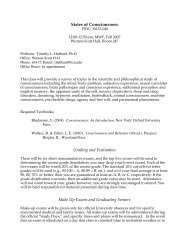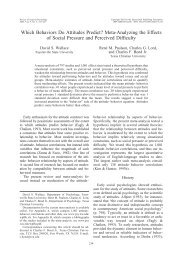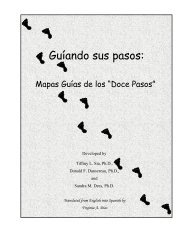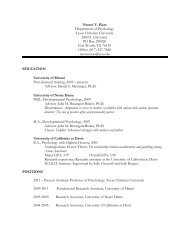TEXAS CHRISTIAN UNIVERSITY - Department of Psychology
TEXAS CHRISTIAN UNIVERSITY - Department of Psychology
TEXAS CHRISTIAN UNIVERSITY - Department of Psychology
Create successful ePaper yourself
Turn your PDF publications into a flip-book with our unique Google optimized e-Paper software.
McIntyre, R. B., Lord, C. G., Frye, G. D. J., & Lewis, S. L. (2003). False memories <strong>of</strong> attitude-relevant<br />
actions. Social Cognition, 21, 395-420.<br />
Lord, C. G., & Lepper, M. R. (1999). Attitude representation theory. In M. P. Zanna (Ed.), Advances in<br />
experimental social psychology (Vol. 31, pp. 265-343). San Diego, CA: Academic Press.<br />
Sia, T. L., Lord, C. G., Blessum, K. A., Thomas, J. C., & Lepper, M. R. (1999). Activation <strong>of</strong><br />
exemplars in the process <strong>of</strong> assessing social category attitudes. Journal <strong>of</strong> Personality and Social<br />
<strong>Psychology</strong>, 76, 517-532.<br />
Cognitive Area<br />
DAVID R. CROSS<br />
Ph.D., University <strong>of</strong> Michigan, 1985<br />
“My training is in developmental psychology and quantitative methods. My past research has focused on<br />
cognitive development, parenting, learning strategies, and quantitative methodology. Currently, the<br />
Developmental Research Laboratory is focusing on research with post-institutionalized children who have<br />
been adopted by U.S. families. We are interested in assessing the impact that special needs adoptions<br />
have on the adopting families, as well as behavioral changes in the children subsequent to adoption. The<br />
centerpiece <strong>of</strong> our project, called The Adoption Project, is a four-week therapeutic summer camp for<br />
adopted children, coupled with a year-round weekend family camp. You can obtain more information<br />
about our current work by visiting our lab web site (go to the <strong>Psychology</strong> <strong>Department</strong> web page, and then<br />
choose “Research Labs”). You can learn more about me, including my publications and presentations, by<br />
visiting my web page (go to “<strong>Psychology</strong>” and then “Faculty”).”<br />
DONALD F. DANSEREAU Director, Center <strong>of</strong> Applied <strong>Psychology</strong>; Associate Director, IBR;<br />
Ph.D., Carnegie-Mellon University, 1969<br />
“I do cognitive engineering. This involves using principles and findings from cognitive psychology to<br />
develop tools and strategies for improving thinking, learning, and problem solving in education, drug<br />
abuse treatment, and business. In addition to improving processing, these tools also provide ‘windows’<br />
into how people think. The emerging information is then used to guide basic research and revise<br />
cognitive theories.”<br />
Selected Publications:<br />
Dansereau, D.F., Dees, S.M., & Simpson, D.D. (1994). Cognitive modularity: Implications for<br />
counseling and the representation <strong>of</strong> personal issues. The Journal <strong>of</strong> Counseling <strong>Psychology</strong>, 41 (4),<br />
513-523.<br />
Dansereau, D.F., & Johnson, D.W. (1994). Cooperative learning. (Chapter 5). In D. Druckman & R.A.<br />
Bjork (Eds.), Learning, remembering, believing: Enhancing human performance, 83-111; references,<br />
319-327). Washington, DC: National Academy Press.<br />
Dansereau, D.F., & Newbern, D. (1997). Using knowledge maps to enhance teaching. In W. E.<br />
Campbell, & K. A. Smith (Eds.), New paradigms for college teaching (pp. 127-147). Edina, MN:<br />
Interaction Book Co.<br />
12






